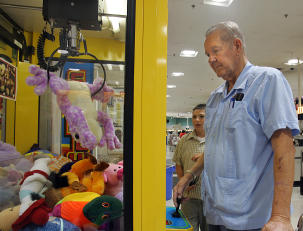5/01/2006
Fun and games are his therapy

Widower gives the toys plucked with arcade crane to children who don't have much
By MARC B. GELLER
MCALLEN - Jim Bloodworth's wife had been seriously ill for about two years, suffering from epileptic seizures, Alzheimer's disease and macular degeneration.
Always the loving and devoted husband, he cared for her in their home as best he could, but with his own mental and physical condition gradually worsening, he was forced to place her in a Mission nursing home in early February.
When his wife, Maxine, died nearly two months later, on March 28, the 78-year-old Bloodworth relied on the same coping mechanism that had helped him through her long illness: He sought out "crane game" machines and dedicated himself to winning the plush toys his wife collected.
"Back before she got ill, we used to go to Furr's cafeteria before it burned down," Bloodworth recalled. "She'd see a toy in (the crane game) there that she'd like, and that was a challenge to me to get it for her."
He remembers spending about $70 on two separate occasions trying to win a large gorilla toy that Maxine had her eye on. The restaurant burned down before he had a chance to go back and try a third time, but the manager recalled his tenacity and salvaged the toy for Maxine.
Tradition of helpingA fixture in front of the crane games, Bloodworth often attracts crowds of children and adults who look on as he grasps the joystick in his hand, maneuvers the claw into position and grabs toy after toy with it, filling up the shopping carts he parks beside the glass enclosure.
Often times, he gives the toys away to younger onlookers whom he senses are from poor families — kids whose daily experience may not be much different from his own Great Depression childhood.
The vast majority of the toys that he doesn't give away on the spot he drops off at the Salvation Army.
It's an organization, he explained, that has been near and dear to his heart for many decades.
"My childhood was in the height of the Depression," he said, recalling times when, as young as 5 years old, he roamed the streets begging and stealing to get food.
"My life as a child was rough, and the only pleasure we got at a holiday — whether it was Easter or Christmas — was getting used clothing from the Salvation Army."
His fondness for the organization grew during his years in the Navy, when the Salvation Army was always ready with a meal for the hungry and a drink for the thirsty. One time, the organization even gave him money when he needed to go home on emergency leave and couldn't afford it.
"When we came into port in Pearl Harbor or San Francisco or San Diego or wherever it was, the Salvation Army was always there and they didn't charge. Everything they did was free," Bloodworth said.
Over the past two years, he estimates, he has given more than 300 toys won from crane games to the local Salvation Army, which gives them away to kids throughout the year.
Recently, it gave away about 175 mostly bunnies, ducks and chicks to children for the Easter holiday.
An inspiration"We gave them out after we had our sunrise service out in our parking lot," said Teresa Alvarado, the organization's Christian education director. Some of the kids were from the shelter, some were regulars at the center and others just came off the street, prompted by their curiosity.
"I'd say that there were about 50 children," Alvarado said.
"Everyone walked away with a stuffed animal.
"It saved us money from having to go out and buy the kids something for Easter, and at the same time the kids enjoyed it and they were able to take something home on that day."
Alvarado said the value of the toys comes as much from the spirit in which Bloodworth won them as from the spirit in which he gave them away.
"They came from a man that really did care about children even though he was hurting himself," she said.
Mourning the loss of his wife of 37 years, Bloodworth continues to take trips to area stores for sessions of crane-game therapy and devotes most of his thoughts to his own children, grandchildren and great-grandchildren.
"The greatest pleasure I have now is trying to inspire, if I can, my grandchildren and great-grandchildren to succeed," he said.
The message he tries to get across to them is that the key to success is finding something you like to do and then working your tail off at it.
He stresses the importance of fluency in Spanish and getting the college education he never had.
"If you wake up in the morning and you hate to go to work, and you don't like your job, I say quit it and get the hell away from it," he said.
"Find something that you really like and enjoy, and then work hard and you'll succeed."